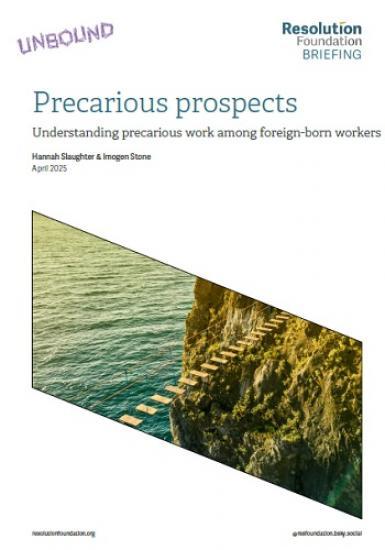Precarious prospects - Understanding precarious work among foreign-born workers
14th April 2025

This briefing note - the second in a Resolution Foundation research programme on precarious work in the UK, supported by Unbound Philanthropy - examines the labour market experiences of foreign-born workers.
While many secure high-skilled, well-paid jobs, we focus on the substantial minority who face barriers to stable and secure employment.
We find that foreign-born workers, particularly those who have recently arrived in the UK, are disproportionately likely to be in precarious forms of work such as flexible contracts (for example, zero-hours or temporary work) or to work in the gig economy (finding work through apps).
And wider qualitative evidence, focusing on the vulnerable groups that the household surveys we use may struggle to pick up, suggests that some foreign-born workers are particularly exposed to unlawful treatment by their employers.
These findings raise clear concerns for some foreign-born workers - but they also have wider implications for the UK labour market. Policy makers should strengthen protections for this group, including ensuring that the new Fair Work Agency enables foreign-born workers to report unlawful treatment without fear of immigration repercussions, to avoid entrenching a two-tier workforce that ultimately drives down standards for all.
Key findings
Among foreign-born workers who arrived in the UK within the past five years, one-in-six (16 per cent) are on a zero-hours, variable-hours or temporary contract, compared to one-in-ten (11 per cent) UK-born workers.
After adjusting for differences in age, sex and qualifications, recently arrived migrants are 2.4 times as likely as comparable UK-born workers to be on a flexible contract. And in fact, once these characteristics are accounted for, the gap is even larger than it first appeared - these compositional factors push down on foreign-born workers' likelihood of being on a flexible contract, so stripping out their effects increases the disparity.
Foreign-born workers without UK citizenship are around three times as likely as UK-born workers to be in the gig economy, where workers are particularly likely to be employed under legal statuses that have fewer rights attached. And among foreign-born workers who have been in the UK for five years or more, 4.9 per cent report being self-employed but either lacking autonomy or paying tax through an employer - indicators of potential bogus self-employment - almost twice the rate among UK-born workers (2.6 per cent).
Overall, one-in-six foreign-born workers – 15 per cent of those who have lived in the UK for five or more years, and 16 per cent of more recent arrivals – are both in precarious work and are either low-paid or live in households with below-average income, making them less able to cope with the financial instability that precarious work can bring.
Substantial inequalities mean some groups are particularly hard hit. For example, more than a quarter (26 per cent) of foreign-born workers from the Pakistani ethnic group, and a fifth (22 per cent) of those from the Bangladeshi ethnic group, are in precarious work, compared to 12 per cent of White foreign-born workers.
Read the full report HERE
Pdf 31 Pages
